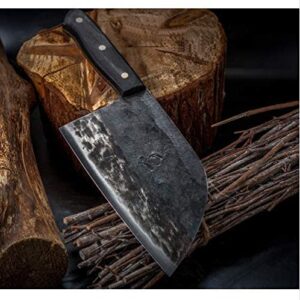Are you tired of seeing the same knife set in the kitchen? Looking for something new? Great idea! One can easily buy almazan knives in this regard. Today I will present a comprehensive overview of if Almazan knives are good or not!
Knives are one of the most necessary things in the kitchen. A sharp but effective knife can make the kitchen task facile while boosting up speed. But some people don’t know what knife would be best suitable for them and began to change the brand again and again. In this way, they have to waste lots of money and time!
Therefore, in this article, I will overview one of the most famous knife brands: Almazan! Are Almazan knives Really Good? Let’s see!
Why Use Almazan Knife?
Almazan Knives are manufactured in Almazan in Spain. The design of the knife is commonly known as the “Serbian Chef’s Knife.” Here is more about Almazan Knives:
Material: Nowadays, most knives are made of stainless steel, but this Almazan Knife is built of High Carbon Steel, which is stronger, more durable than stainless steel, and capable of maintaining a sharp edge for a long time.
The carbon steel is thick and sharpened at the edge to slice through anything. Moreover, the handle is made of modern pakka-wood compressed under high pressure to create a condensed yet natural wood to keep moisture out!
Blade: The Spanish Damascus blade of the Serbian chef knife is carbon steel with a hardness of 58-60 HRC. The best thing about the blade is that it is forged, hand-ground, and lightweight, only 1.87 pounds! That’s why one doesn’t have to be tense about its premium quality and performance.
How Many Types of Almazan Knives Are There?
There are mainly two types of Almazan Knives; Bushcraft style and Chef style.
Bushcraft style: This style denotes a heavy 5/32″ thickened blade for ‘wilderness skills, chopping, hacking, tracking & hunting.” It is mostly for adventurous purposes.
Chef style: This style uses a 3/32″ thinner blade convenient for daily kitchen usage such as slicing & dicing.
Some Most Famous Models of Serbian Chef Knives
Serbian chef knife, also known as the almazan kitchen knife, is the best for professional chefs. From ancient times advanced technology was applied to manufacture hard and sharp knives in Germany, France, and Serbia.
These knives are being used by the professional chefs of Australia, Canada, South Africa, the Philippines, and many countries and are also available on Amazon, and reddit with a prestigious rating!
Almazan Kitchen Knife Damascus
Almazan kitchen knife Damascus features a Rain Drop Pattern and is 11 Inches. Therefore, the small size of the knife is convenient for daily usages such as chopping and cutting. This model of Almazan knives uses Damascus steel which is reputed for its strength and sharpness.
Another characteristic of the almazan kitchen knife Damascus is that a wavy, mottled pattern runs through the blade. One can also use it as a cleaver. It comes with a leather sheath of high-quality cow skin
Presenting the VKA handmade steel Serbian knife is one of the best Almazan kitchen knives for light tasks such as cutting and chopping fruits and vegetables. It does not work well on meat, but one can use it for cutting meat. The length of this kitchen knife is 11.5 inches, and the handle is 5 inches.
It comes with cow skin leather sheathe Carbon Steel butcher Serbian Cleaver kitchen knife For chopping and cutting, this is another top-quality kitchen knife. It is made up of durable carbon steel. But if the knife comes up without proper maintenance that sharpness wouldn’t last long.
If one can lean and dry the knife after every use, one can use it longer times. Since Damascus steel requires a quite rigorous maintenance process. With the leather sheathe, it is pretty decorated and looks classy.
How To Care For Almazan Knives?
Almazan kitchen use carbon steel which is different from stainless steel and requires a different maintenance process.
- Carbon steel is not rust-free steel. So, you have to maintain it after every usage to last longer!
- Clean the knife as quickly as possible after using it and wipe it with a dry towel.
- Keeping the blade dry is crucial. Otherwise, the steel will create oxidation.
- One can also use vegetable oil to lubricate the blade
How To Sharpen the Best Serbian Chef Knife?
There are several ways to sharpen Serbian Chef knives. Some of them are mentioned below:
Whetstone or Diamond Stone: One can sharpen the knife efficiently with a Whetstone or Diamond Stone.
Lubricate the Stone: One will need honing oil and whetstone stone. Lubricate the stone with oil and then pass the blade over the stone.
Grinding and Sharpening: Diamond stones and Whetstones come in two parts, one part is for grinding, and the other part is for sharpening. Use the fine-grit side for sharpening the knife.
Frequently Asked Questions
- Are Serbian Knives Good?
They are one of the best chef knives. Most of professional chefs pick Serbian knives for their everyday cutting, chopping, and slicing jobs because they are extremely sharp and durable.
- Who Makes The Best Serbian Chef Knife?
There have several brands available on the market that makes the best quality Serbian chef knife. Kopala kitchen knife cleaver is top of them all. One can also find Vk Damascas Serbian knife, Cooling Promaja Serbian chef’s knife, XYZ full tang butcher knife performs extremely sharp, and durable.
Are almazan knives legit?
Yes! For cutting, and chopping meat and vegetables, Almazan knives are great. Moreover, they are durable and lightweight if one can take proper care of the knives.
Wrap Up
Now we believe everyone will agree that Almazan Kitchen knives are distinctive from other similar items. They offer a lightweight but convenient knife.
As a result, the Almazan kitchen knives are on the top-choice list of professional chefs! But never forget to take proper care of the knives for longer usage. Therefore, it can be said that Almazan kitchen knives are not only good but also one of the best knives!


